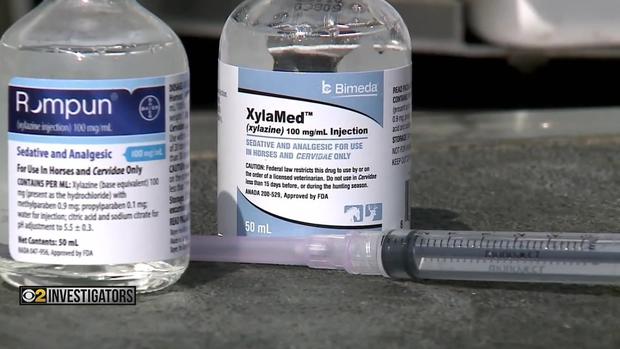White House warns of "emerging threat" of fentanyl and xylazine, a veterinary drug
The U.S. has named a veterinary tranquilizer as an "emerging threat" when it's mixed with the powerful opioid fentanyl, clearing the way for more efforts to stop the spread of xylazine.
The Office of National Drug Control Policy announced the designation on Wednesday, the first time the office has used it since the category for fast-growing drug dangers was created in 2019.
Dr. Rahul Gupta, director of the drug policy office, said xylazine (pronounced ZAI'-luh-zeen) has become increasingly common in all regions of the country.
The Drug Enforcement Administration warned it had found xylazine in nearly a quarter of the fentanyl powder it seized in 2022. It was detected in about 800 drug deaths in the U.S. in 2020 — most of them in the Northeast. By 2021, it was present in more than 3,000 fatalities —with the most in the South — according to a report last year from the DEA.
"We cannot ignore what we're seeing," Gupta said. "We must act and act now."
Xylazine was approved for veterinary use in 1971. Sometimes called "tranq," it's been showing up in supplies of illicit drugs used by humans in major quantities in only the last several years. Xylazine has been found in multiple overdoses, but because it is combined with other substances like fentanyl or heroin, experts said it was hard to account for how responsible it was for those overdoses.
"It is difficult to know which substance contributes most to fatality when an individual has more than one substance in their body at the time they died," Jose Benitez, the lead executive officer of Philadelphia-based harm reduction organization Prevention Point, previously told CBS News.
It's believed to be added to other drugs to increase profits and to extend the length of a high. Officials are trying to understand how much of it is diverted from veterinary uses and how much is made illicitly. The Food and Drug Administration has previously issued an import alert to attempt to stop illicit xylazine from entering the country.
The drug causes breathing and heart rates to slow down, sometimes to deadly levels, and causes soft-tissue wounds that can require amputation if not treated. Withdrawal is also painful.
While it's often used in conjunction with opioids, including fentanyl and related illicit lab-made drugs, it's not an opioid. There are no known antidotes for xylazine.
Gupta said his office is requesting $11 million as part of its budget to develop a strategy to tackle the drug's spread. Plans include developing an antidote, learning more about how it is introduced into illicit drug supplies so that can be disrupted, and looking into whether Congress should classify it as a controlled substance.
Gupta said it needs to be available for veterinary uses even amid crackdowns on the supply used by people. He also said systems to detect the drug and data about where it's being used need to be improved.
The drug is part of a deepening overdose crisis in the U.S.
The U.S. Centers for Disease Control and Prevention estimates that more than 107,000 people died from overdoses in the 12 months that ended Oct. 31, 2022. Before 2020, the number of overdose deaths had never topped 100,000.
Most of the deaths were linked to fentanyl and other synthetic opioids. Like xylazine, they're often added to other drugs — and users don't always know they're getting them.
Kerry Breen contributed to this report.




